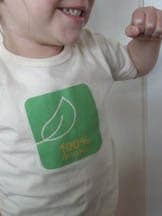
My daughter and I recently reviewed a 100% cotton T-shirt from Go Baby.com.
While reading about Go Baby’s organic line I learned that: Organically grown cotton is not treated with pesticides, herbicides or petroleum based fertilizers and is manufactured in a much more environmentally sustainable way.
After reading this I wanted to learn more about the differences between regular cotton and organic cotton so I started doing some on-line research. Most sites I found said the same thing but I thought that The green basics on Treehugger.com summed it up best.
Conventional cotton is one of the most chemically-dependent crops
- 10 percent of all agricultural chemicals & 25 percent of insecticides on 3 percent of our arable land
- 1/3 of a pound of chemicals are needed to produce enough cotton for a T-shirt and 3/4 of a pound for a pair of jeans!
Organic cotton starts with the soil.
- Compost, frequent crop rotations and cover crop strategies replace synthetic fertilizers to keep the soil healthy and productive.
- Weeds are controlled by innovative farm machinery, hand labor or flame devices rather than herbicide applications.
- Organic farmers cultivate a diversity of natural enemies which prey on insect pests, and lure pests away from cotton by planting trap crops.
- Organic growers shut off water early, and apply certified materials to promote cotton boll opening and leaf dropping, readying the fibers for harvest.
Wow! Those are some amazing differences.
I know that purchasing 100% organic cotton products(like the t-shirts and onezees from Go Baby.com) is an important way for us to show our commitment to the health of our environment, our children, and those people who pick the cotton.
As much as I would love to buy only 100% organic cotton products I just can’t afford to.
Recently I was looking for a pair of organic jeans and the average price I found was $99. I just can't afford $99 for a pair of jeans, no matter how much I know it's worth the $.
In all honestly, I am more likely to buy organic clothes for my daughter than …











